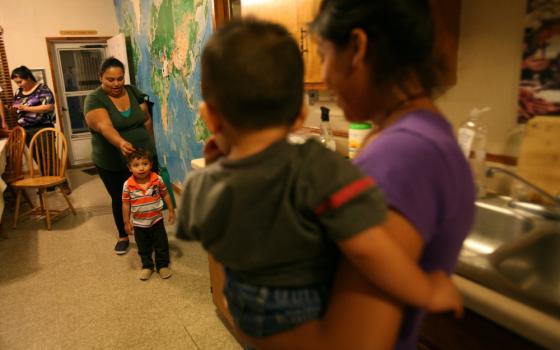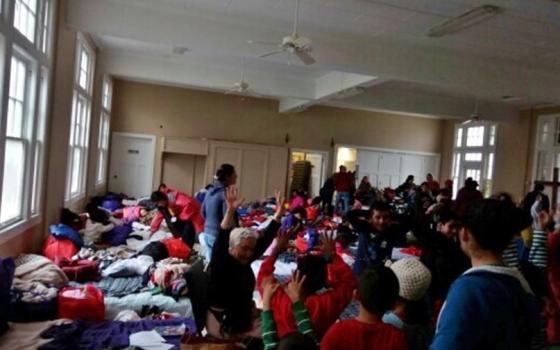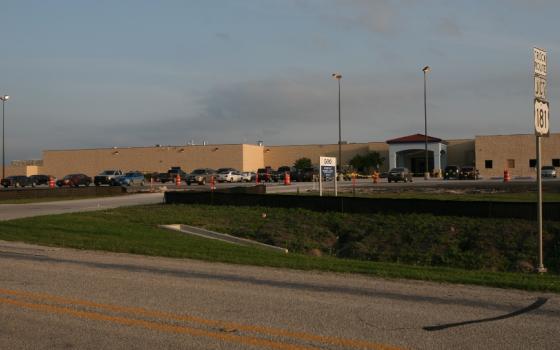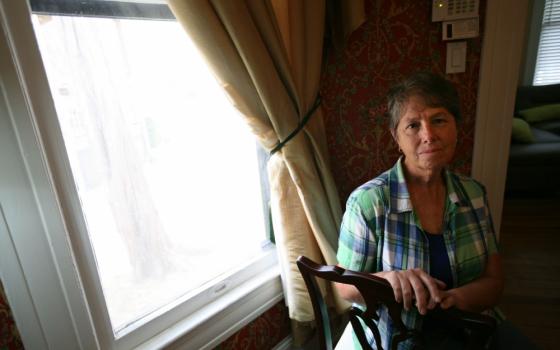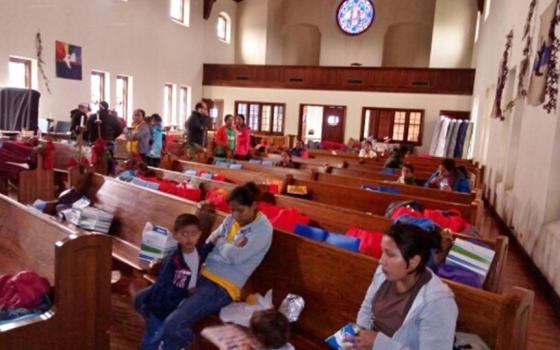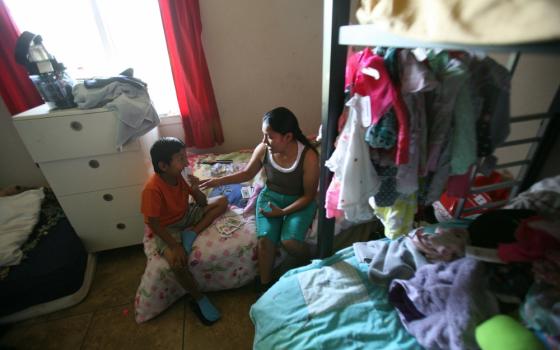Days after a Texas judge ruled that a state agency cannot issue day-care licenses to two immigration detention centers, attorneys and advocates for asylum seekers acted to ensure the decision withstands challenges. Activists and volunteers are hopeful it signals a change in U.S. immigration policy and practice.
"It's detention and it's not child care, so it would be mislabeling what the facility really is," said Daughter of Charity Sr. Denise LaRock, who volunteers at Casa de Raices, a temporary shelter for newly released immigrant women and children in San Antonio. She and other advocates applauded the December 2 decision that prevents the issuing of day-care licenses to the facilities at Karnes City and Dilley, Texas. "It's my hope that the rights and needs of the mothers and children will be better respected by Homeland Security."
Shortly after the ruling, she and other activists were heartened by the arrival of hundreds of women and children at Casa Raices. Volunteers picked them up at the San Antonio bus station where detainees from both Karnes and Dilley are typically dropped off after they are released from the centers. LaRock, other women religious and volunteers at the center said more than 300 detainees sought shelter on Monday, up from the usual 50. They hoped this was a signal that the government was starting to wind down family detention operations.
But the release was part of "normal operations and not in response to a court ruling," said Carl Rusnok, a spokesperson for Immigration and Customs Enforcement. Currently the combined population at the two centers is at 2,393, according to ICE statistics. For now, advocates may not see many changes as the two detention centers continue to operate "without interruption," Rusnok said.
The ruling by Judge Karin Crump in Austin is the latest in a series of salvos that have pitted the Texas Department of Family Protective Services and companies operating the detention centers against attorneys and advocates for detainees. Advocates, including many women religious, contend the facilities violate a 1997 ruling known as the Flores decision that children cannot be detained for long periods of time in secure, unlicensed facilities. That ruling was upheld in 2015.
Krump's ruling also invalidated the license that the Texas Department of Family and Protective Services granted Karnes County Residential Center as a child-care center, according to a statement by Grassroots Leadership, an immigrant advocacy non-profit organization, which challenged the licensing. The license was granted earlier this year only after the state agency lowered its licensing standards.
The legal maneuvering continued this week as attorneys representing the detainees and advocacy groups in the suit against the state's child-care licensing agency, preemptively filed a motion early December 5 requesting that the state adhere to the ruling while an appeal is in play. A few hours later, the state's attorney general filed a motion appealing the December 2 decision.
Because the suit is against the government, the practice of families being detained can remain while the appeal is resolved, explained Robert Doggett, an attorney with Texas RioGrande Legal Aid, which represented detainees along with Grassroots Leadership. Doggett filed the motion December 5 asking the judge to apply the December 2 ruling immediately to keep the state from issuing a license to Dilley and other detention centers in the pipeline.
Advocates and volunteers who work with immigrants hope the ruling brings them closer to ending a detention policy that the Obama administration had resurrected in 2014.
"The conditions at Karnes and Dilley are equivalent to prisons, not child-care facilities," said Bob Libal, executive director of Grassroots Leadership in a statement. "We are glad the court heard our concerns about the damage that family detention does to mothers and their children and how lowering standards to issue licenses to these facilities only exacerbates that harm."
GEO, the company that runs the Karnes facility said its center has "always been in compliance with ICE's Family Residential standards," according to a statement from company spokesperson, Pablo Paez. "We strongly believe that state licensing is an important added step, which is in the best interests of the families entrusted to our care."
Jonathan Burns, spokesperson for Corrections Corporation of America, the corporation that runs Dilley's South Texas Family Residential Center, sent a similar statement: "Providing a safe, humane and appropriate environment for those entrusted to our care is our top priority," he said, "and we work in close coordination with our on-site partners at ICE to ensure that goal is being met at the South Texas Family Residential Center on an hour-to-hour and day-to-day basis."
Immigration attorneys and advocates say the companies are seeking licenses solely as a business decision. In a Securities and Exchange Commission (10-K) document filed in 2016 and presented in state court as part of the licensing hearings, GEO told its stockholders licensing would lengthen stays in detention.
"Presently, the center operates as a short-term processing facility and this licensing process will allow for longer lengths," stated the company in its 10-K document.
"They thought that if they could achieve a license that that would allow them to have people in detention for longer periods of time, which of course they are reporting to their shareholders as a positive business development," Libal said.
Conditions inside detention
Volunteers familiar with the operations say that the facilities lack the qualified staff and sensitivity that is inherent in a true day-care center.
Yvonne Dilling, director of Mission Education with the Maryknoll Fathers and Brothers in San Antonio and a volunteer with the Interfaith Welcome Coalition, a group dedicated to welcoming refugees, described how a woman guarding the visiting area at Karnes restricted children to an area rug about 5-by-5 square feet, while their mothers talked with immigration lawyers.*
"She's all the time chastising the children for getting off the carpet," Dilling said. As a result they won't leave their mothers alone "because there's a woman out there with a nasty expression on her face."
A facilities coordinator got upset because kids coloring with crayons went off the paper and marked up a table. As a result, crayons were banned in most areas except the school after the coordinator called it "vandalized property," Dilling said.
Advocates also hope the ruling prevents the state from putting children at risk after it lowered its licensing standards.
"They just kind of gave the facilities carte-blanche exceptions, for example allowing children to be forced to share a bedroom with an unrelated adult," said Doggett who represented one client whose child was sexually assaulted by another adult sharing her bedroom in a detention center.
"It's beyond shocking, it's disgusting that they would put these children at more risk," Doggett said.
Sr. Bernadine Karge, a Sinsinawa Dominican sister and immigration attorney in Chicago who has volunteered in Dilley's detention center several times, said that at this point, she doesn't care about the legal details as long as people are being released.
"We'll take it down anyway we can," she said. "[The government's] policy is so inconsistent, you never know which way the wind will blow. But if they want to let the people out, let them out."
Each time Karge travels to Dilley, she is profoundly moved by the experience, and it often takes her several weeks to recover from what she has seen there. Her most recent trip ended December 2. (She wrote about the experience for Global Sisters Report.)
She broke into tears several times while speaking to GSR. "To look the women in their eyes and see their beautiful children, their love for their children . . . the way the kids hang on to their moms," she said.
Karge said people need to understand that those being held in detention are not just trying to get better jobs or "cash in" on the American way of life — they're leaving their homes, their language, their relatives and fleeing for their very lives.
"One woman there was crying about her teenage daughter being recruited by the gangs. You will leave everything to protect your children."
If detention centers are licensed, the government would argue that they meet the standards in the Flores case. In last year's decision, a federal judge upheld a previous ruling that children cannot be kept in secure unlicensed facilities for prolonged periods of time, for no more than five to 20 days, depending on circumstances.
"Not only are these facilities immoral but illegal under what the judge has said many times," Libal said. "This reiterates what we've been saying that a prison is not a child care facility."
[Nuri Vallbona is a freelance documentary photojournalist. She worked for the Miami Herald from 1993 to 2008 and has been a lecturer at the University of Texas and Texas Tech University. Dan Stockman is national correspondent for Global Sisters Report. Follow him on Twitter or on Facebook.]
Related - Supportive community-based programs mean greater success for asylum-seekers
and Detention center receives child care license from state of Texas
* Editor's note: An earlier version of this story incorrectly identified Yvonne Dilling's job.
